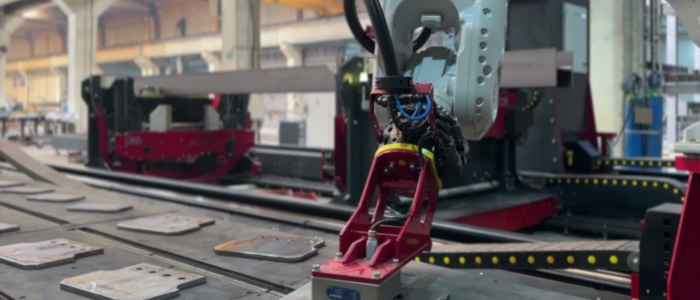White Paper – The Next Big Thing in Structural Steel Fabrication

THE NEXT BIG THING IN STRUCTURAL STEEL FABRICATION
WHAT IS STRUCTURAL STEEL FABRICATION?
The process of bending, cutting, and shaping steel to create a product is known as structural steel fabrication. This process requires a special skill that takes years of expertise transforming raw materials into products that meet and exceed various standards and requirements.
WHO USES STRUCTURAL STEEL FABRICATION?
Structural steel fabrication has many applications across a wide variety of industries such as 5G poles, power transmission towers, shipyards, metal and machine construction, bridge building, aviation, agricultural machine engineering, automotive, steel construction/fabrication, and steel service centres. Specialist Machinery Sales is proud to showcase a full range of structural steel machinery options for these industries. Check out your machinery options here.
HOW DOES STRUCTURAL STEEL FABRICATION WORK?
Structural steel fabricators use a certain method before manufacturing giant structures such as skyscrapers, industrial equipment, staircases, wind turbines, pipelines, trains, and more:
PHASE 1: PLANNING
Partnering with a structural steel fabricator gives you an opportunity to customise solutions by ordering pre-defined components specific to your given project. Afterwards, the structural steel fabricator will then draw blueprints via specialised engineering software for you to verify later on the correct specifications, code compliance and any details deemed necessary for your project.
This will then be transformed into shop drawings and plans, which will include critical aspects of the project such as budget, timelines/milestones, deliverables, and logistics.
PHASE 2: CUTTING AND DRILLING
This is the initial step in carrying out the structural steel fabrication. Structural steel is cut by shearing or sawing using different tools such as laser cutting, plasma cutting and waterjet cutting tools. Specialist Machinery Sales offer a variety of pre-fabrication machinery for cutting and drilling steel components. Choose from our extensive selection from bandsaws to beamlines and coping robots, plus plasma cutters, pipe rotators and shot blasting machines here.
PHASE 3: BENDING
Some project requirements for structural steel fabrication need the bending of alloy. Plate bending is yet a challenging process since careful operation should always be executed to maintain a safe working environment while producing more and precise output. Specialist Machinery Sales helps address this challenge by partnering with a leading brand in metal bending - Haeusler. Choose from its wide range of plate and section bending machines, special forming, assembly equipment and production lines here.
PHASE 4: MARKING
Marking systems in the steel industry are done with parts being labelled to easily identify the material and to easily locate the pieces so they can be allocated properly. Specialist Machinery Sales provides structural steel fabrication with a wide range of marking systems and advises structural steel fabricators with the right machine to help increase their workshop’s productivity. Find out here.
PHASE 5: ASSEMBLY
This is the final step for structural steel fabrication where all components are put together to form the finished product - structural steel. The steel constructions may be assembled in two ways: one by welding, and the other by bonding the sections together with adhesives.
PHASE 6: FINISHING
If you requested finishing of structural steel either through paint, powder coat, sandblasting, shot blasting or specified process of finish, your structural steel fabricator will then execute this as the post-fabrication step. Specialist Machinery Sales provides post-fabrication solutions from shot blasting and painting systems, to zinc spraying and powder coating systems - providing complete painting and surface treatment solutions for cleaning plates, profiles and tubes. Check your machinery options here.
WHY STRUCTURAL STEEL FABRICATION?
There are many advantages to industries such as steel construction/fabrication and steel service centres of why they need to fabricate structural steel with the right partner and with the right tool as this is highly complex and requires experience and abilities to be effective.
- Steel is stronger and cheaper compared to other metals
- Steel is low maintenance compared to other materials
- Steel is malleable thus it’s easier to customise for project specifications
- The prefabrication and fabrication stages being done on-site helps reduce man-hours and increases workshop productivity, provided having the right tools/machines to fabricate the structural steel with
- Fabricating steel is environment-friendly because of its capability to be reused/recycled, at the same time, generates less carbon dioxide
Clients of Specialist Machinery Sales have observed an increase in their workshop's capabilities and productivity as a result of an investment in a CNC machine tool intended to handle structural steel fabrication efficiently and effectively. Discuss your machinery strategies with us today.
THE FUTURE OF STRUCTURAL STEEL FABRICATION
According to the Australian Steel Institute, digital procedures have had a major and beneficial influence on the whole supply chain for delivery of a finished steelwork structure, resulting in enhanced speed, safety, constructability, and quality. The introduction of computer-assisted design and augmented reality are only two of the numerous digital innovations that have contributed to the speeding up of structural steel fabrication.
Clients of SMS are recognised now as the leader in the space they operate and their competitors have witnessed incredible growth. Our clients' competitors are now moving into various areas of fabrication after SMS clients dominated that field, where these rivals can no longer compete owing to the technology our suppliers have added to the machines we offer to our clients.
Learn More
Contact Specialist Machinery Sales today to discuss a superior machinery strategy for your business.
